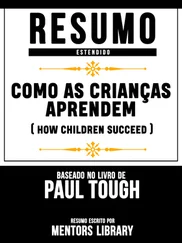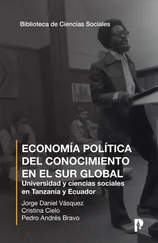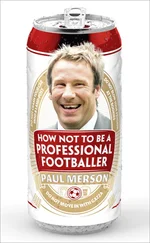I send heartfelt thanks to the family and friends who offered support and counsel and welcome distraction along the way, including Susan Tough, Anne Tough, Allen Tough, Jack Hitt, Michael Pollan, Ethan Watters, Ann Clarke, Matt Klam, Kira Pollack, James Ryerson, Elana James, and Ilena Silverman.
Above all, my thanks go to Paula, Ellington, and Georgie, for their help, their support, and their love. In the acknowledgments of my last book, I promised Paula that this one would be easier, and it wasn’t. But she persevered anyway, with patience and good humor and large helpings of grit. The research papers I immersed myself in while writing this book taught me a great deal about the transformative power of a family’s love—but that knowledge is nothing compared to what I learn from her each day.
a program called Tools of the Mind: For more on Tools of the Mind, see Paul Tough, “Can the Right Kinds of Play Teach Self-Control?,” New York Times Magazine , September 25, 2009.
the Rug Rat Race : Garey Ramey and Valerie A. Ramey, The Rug Rat Race (Cambridge, MA: National Bureau of Economics Research, January 2010).
“Age 3 is the sweet spot”: Kate Zernike, “Fast-Tracking to Kindergarten?,” New York Times , May 13, 2011.
You can trace its contemporary rise: Carnegie Task Force on Meeting the Needs of Young Children, Starting Points: Meeting the Needs of Our Youngest Children (New York: Carnegie Corporation of New York, 1994).
One of the most famous of these studies: Betty Hart and Todd R. Risley, Meaningful Differences in the Everyday Experience of Young American Children (Baltimore: Paul H. Brookes, 1995).
At age twenty-two, Heckman found: James J. Heckman, John Eric Humphries, and Nicholas S. Mader, “The GED,” in Handbook of the Economics of Education , vol. 3, eds. Eric A. Hanushek et al. (Oxford: Elsevier, 2011), 455, figure 9.16. For more on Heckman’s GED research, see James J. Heckman, Jingjing Hsse, and Yona Rubinstein, “The GED Is a ‘Mixed Signal’: The Effect of Cognitive and Non-Cognitive Skills on Human Capital and Labor Market Outcomes,” unpublished paper, revised March 2002; and James J. Heckman and Yona Rubinstein, “The Importance of Noncognitive Skills: Lessons from the GED Testing Program,” American Economic Review 91, no. 2 (May 2001).
“ Inadvertently, the GED has become a test”: Pedro Carneiro and James J. Heckman, “Human Capital Policy,” in Inequality in America: What Role for Human Capital Policies ?, eds. James J. Heckman and Alan B. Krueger (Cambridge, MA: MIT Press, 2003), 141.
the Perry students were more likely to graduate: James J. Heckman, Seong Hyeok Moon, Rodrigo Pinto, Peter A. Savelyev, and Adam Yavitz, “The Rate of Return to the High/Scope Perry Preschool Program,” Journal of Public Economics 94, nos. 1 and 2 (February 2010). For more on Perry, see James Heckman, Lena Malofeeva, Rodrigo Pinto, and Peter Savelyev, “Understanding the Mechanisms Through Which an Influential Early Childhood Program Boosted Adult Outcomes,” unpublished paper, November 23, 2011.
“ personal behavior” and “social development”: James Heckman, Lena Malofeeva, Rodrigo Pinto, and Peter Savelyev, “Enhancements in Noncognitive Capacities Explain Most of the Effects of the Perry Preschool Program,” unpublished paper, January 13, 2010.
1. How to Fail (and How Not To)
he placed Fenger in the most dire category: Michael Martinez, “City’s Schools Now Thinking Small,” Chicago Tribune, September 20, 1996.
hiring an outside contractor: Lynn Schnaiberg, “Scores Up But Schools No Better,” Catalyst Chicago, March 2001.
He created a freshman academy: Martinez, “City’s Schools.”
a math-and-science academy: Jody Temkin, “Last-Minute Decisions Keep Fenger on Its Toes,” Catalyst Chicago, October 1999.
he made Fenger a magnet school: Michael Martinez, “Magnet Programs to Expand in City Schools,” Chicago Tribune, March 16, 2001.
Duncan chose Fenger as one of the pilot schools: David Mendell, “City Dropouts Target of Grant,” Chicago Tribune, April 18, 2006.
the total bill for the citywide project: Sarah Karp, “If at First You Don’t Succeed… Turnaround and Go Big,” Catalyst Chicago, January 16, 2009.
“a truly historic day”: Mendell, “City Dropouts.”
Fenger was switched over: Karp, “If at First”; Sarah Karp, “Putting the Brakes on High School Transformation,” Catalyst Chicago, April 28, 2009.
eighty-three school-age teenagers were murdered: Sarah Karp, “Youth Murders Up, Money for School Violence Prevention in Doubt,” Catalyst Chicago, January 28, 2011.
“Turning Gold into Lead”: English translation of Vincent Felitti, “Belastungen in der Kindheit und Gesundheit im Erwachsenenalter: die Verwandlung von Gold in Blei,” Zeitschrift für Psychosomatische Medizin und Psychotherapie 48 (2002).
Over the course of a few years: Shanta R. Dube, et al., “Childhood Abuse, Household Dysfunction, and the Risk of Attempted Suicide Throughout the Life Span,” Journal of the American Medical Association 286, no. 24 (December 26, 2001).
two-thirds of the patients had experienced: Ibid.
they “stunned us”: Robert Anda, “The Health and Social Impact of Growing Up with Adverse Childhood Experiences,” unpublished paper, www.acestudy.org.
Compared to people with no history of ACEs: Robert Anda, Vincent Felitti, et al., “The Enduring Effects of Abuse and Related Adverse Experiences in Childhood: A Convergence of Evidence from Neurobiology and Epidemiology,” European Archives of Psychiatry and Clinical Neurosciences 56 (2006). For more on the ACE data, see Vincent J. Felitti and Robert F. Anda, “The Relationship of Adverse Childhood Experiences to Adult Medical Disease, Psychiatric Disorders, and Sexual Behavior: Implications for Healthcare,” in The Hidden Epidemic: The Impact of Early Life Trauma on Health and Disease, eds. Ruth A. Lanius, Eric Vermetten, and Clare Pain (Cambridge: Cambridge University Press, 2010); Valerie J. Edwards et al., “The Wide-Ranging Health Outcomes of Adverse Childhood Experiences,” in Child Victimization, eds. K. A. Kendall-Tackett and S. M. Giaromoni (Kingston, NJ: Civic Research Institute, 2005); and Vincent J. Felitti, Paul Jay Fink, Ralph E. Fishkin, and Robert F. Anda, “An Epidemiologic Validation of Psychoanalytic Concepts: Evidence from the Adverse Childhood Experiences (ACE) Study of Childhood Trauma and Violence,” in Trauma und Gewalt 1 (2006).
twice as likely to smoke: Anda, Felitti, et al., “Enduring Effects.”
twice as likely to have heart disease: Edwards et al., “Wide-Ranging Health Outcomes.”
twice as likely to have liver disease: Maxia Dong et al., “Adverse Childhood Experiences and Self-Reported Liver Disease,” Archives of Internal Medicine 163 (September 8, 2003).
thirty times more likely to have attempted suicide: Dube et al., “Childhood Abuse.”
forty-six times more likely to have injected drugs: Felitti and Anda, “Relationship of Adverse Childhood Experiences.”
their risk of ischemic heart disease: Felitti et al., “Epidemiologic Validation.”
When a potential danger appears: For this description of stress function, I’m relying on Robert M. Sapolsky, Why Zebras Don’t Get Ulcers (New York: St. Martin’s Press, 1994); Seymour Levine, “Stress: An Historical Perspective,” in Handbook of Stress and the Brain, Part 1: The Neurobiology of Stress, eds. T. Steckler, N. H. Kalin, and J.M.H.M. Reul (Amsterdam: Elsevier, 2005); and Center on the Developing Child at Harvard University, The Foundations of Lifelong Health Are Built in Early Childhood (Cambridge, MA: Center on the Developing Child, 2010).
Читать дальше
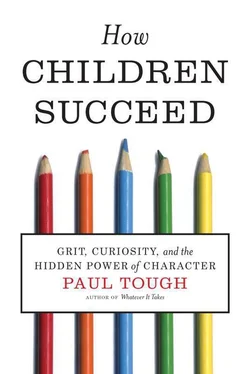

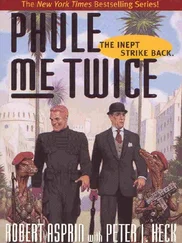
![Коринн МакКей - How to Succeed as a Freelance Translator [calibre 3.46.0]](/books/402693/korinn-makkej-how-to-succeed-as-a-freelance-transl-thumb.webp)


